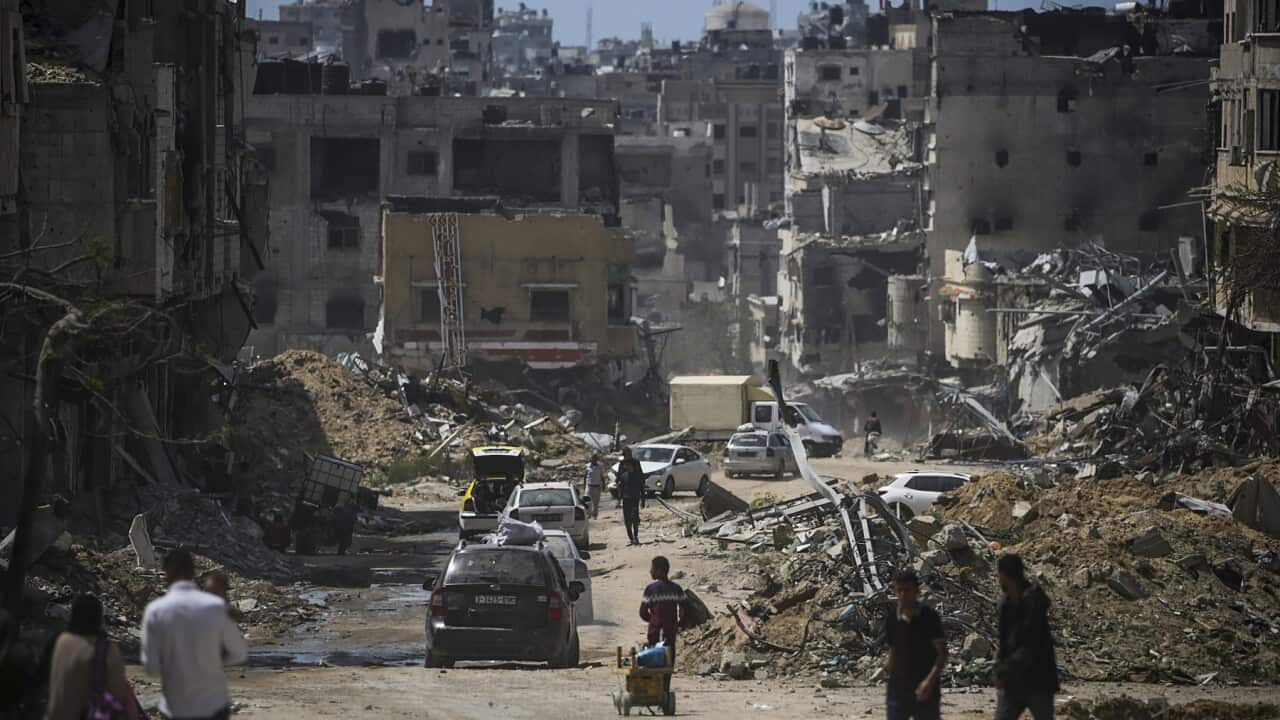TRANSCRIPT
At Nasser, the main hospital in the southern Gaza city of Khan Younis, Raeda Abu al-Ola has come to look for the missing body of her son Jamal.
The Palestinian Civil Defence in Gaza says since Friday it has now recovered 283 bodies from a temporary burial ground built when Israeli forces were besieging the facility last month.
The group says people were not able to bury the dead in a cemetery at the time and dug graves in the hospital yard instead.
Raeda Abu al-Ola says she wants to honor her son's wish to be buried alongside his father.
“I've come here for the fifth day to look for the body of my son Jamal. They told us that there was a mass grave located here, and every day I have come to identify the body, but unfortunately, I have not found it.”
The United Nations Special Rapporteur on the right to health, Dr Tlaleng Mofokeng, has warned that long-term trauma for people in Gaza, where more than 34,000 people have been killed in Israeli offensives since October 7th, could lead to a mental health crisis for years to come.
This comes as an independent review into the neutrality of another UN mission has delivered its final report.
Former French Foreign Minister Catherine Colonna, who led the review, says the UN agency for Palestinian refugees, UNRWA, has some neutrality-related issues, but remains "indispensable and irreplaceable" for Palestinians.
She has recommended better implementation of measures around staff publicly expressing political views, including on social media, but says the agency has "robust" procedures to uphold the UN principle of neutrality.
“Actually it probably have of a more developed system than other UN organisations or agencies, which is a necessity considering the very difficult environment, complex and difficult situation in which they operate and the uniqueness of their mission. There's always room for improvement and some issues related to neutrality persist, this is why this mission was created.”
Ms Colonna said the review is yet to receive evidence of Israel's allegations 12 of its 13,000 staff members in Gaza participated in Hamas' October 7th attacks, the subject of a separate UN investigation.
A spokesperson for the Israeli Foreign Ministry has described the report as "insufficient", although Catherine Colonna noted Israeli officials had been helpful with the panel.
UN Secretary-General Antonio Guterres has expressed support for the recommendations.
So too has the United States, one of only a few countries yet to reinstate UNRWA funding paused after Israel's allegations.
State Department Spokesperson Matthew Miller has rejected the idea the US had effectively imposed sanctions on the agency, after Congress approved - and President Joe Biden signed - a ban on UNWRA funding until 2025.
“If there has not been proper accountability, then we suspend our assistance. But it is a suspension of assistance that can be remediated. There are certain steps that a government can go through to remediate that suspension of assistance. But no, it is not a sanction in the classic sense that Treasury imposes sanctions or even that the State Department in some areas imposes sanctions.”
The Biden administration is under pressure following mass arrests and cancelled classes as pro-Palestinian protests took place at universities across the US.
Secretary of State Antony Blinken, speaking at a press conference on human rights practices of other countries, was asked if the country had a double standard when it came to Israel.
“Do we have a double standard? The answer is no. As this report makes clear, in general, as we're looking at human rights and the condition of human rights around the world, we apply the same standard to everyone. And that doesn't change whether the country in question is an adversary, a competitor, a friend or an ally.”
Mr Blinken is reportedly poised to impose the first ever sanctions on an IDF unit - the ultra-Orthodox Netzah Yehuda battalion - some of whose members have been accused of human rights abuses in the occupied West Bank.
Israeli defence minister Yoav Gallant met on Monday with members of the unit, where he condemned the decision as unfair and vowed to oppose it.
“The fact that one, or two, or soldiers did something wrong that does not cast blame on the entire battalion. The battalion is a fighting force, which does its job at a very high level. If there is someone and something happens with them, we take care of them.”
While the Netanyahu government faces its own domestic scrutiny for its handling of the conflict, Israel's military intelligence chief has become the first top official to step down for failing to prevent Hamas' attack.
In a statement, Major General Aharon Haliva said he was still living with what he described as a "black day", in which around 1200 people were killed in southern Israel, and more than 250 taken hostage.
In Tel Aviv, the families of hostages gathered to attend a seder dinner in support of the around 130 still held captive in Gaza, as they marked the religious holiday of Passover.
Gil Dickmann, whose cousin Carmel Gat is one of 14 women still held in Gaza, expressed hope for freedom from the conflict.
“What we're focused in is reminding the other people around us that she is still alive that we can still bring her back and this is, this is a holiday that celebrates freedom, so we don't commemorate people here, we try to remind other people that freedom is still possible and that people should be free.”













